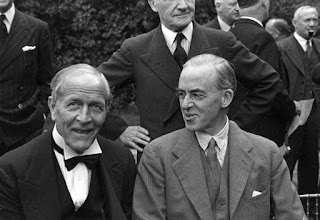Sir Stafford Cripps Continues to Try to Align British Policy with Soviet Wishes
Wednesday 25th November
1936
The Labour Party continued its
gentle shift back towards the right of politics with moves on two high profile figures
in the movement, one a readmittance and the other the public censure of the extreme left-winger Sir Stafford Cripps. Readmitted
was Sir William Jowitt, the former Solicitor General, who had been expelled
when he joined Ramsay Macdonald’s National Government in 1931. This was essentially
a symbolic act of reconciliation; Jowitt’s political career was fading although both he and Cripps were to sit in Attlee's Cabinet in 1945.
Of greater practical significance
was the censure of Cripps for saying that
if Germany defeated Britain in a capitalist war (whatever that was) it might be
no bad thing for the British working class. He was also trying to promote a
three-way “united front” between the Communist Party, the Socialist League - a
constituent of the Labour Party in which Cripps was a prominent member – and the
Independent Labour Party. It would foster “mass resistance” to rearmament,
military recruitment and “regional pacts”, a code for any diplomatic alliance
other than one with the Soviet Union. Cripps’s move appeared designed to
undermine the support for rearmament by the Trades Union Congress, which was
powerfully symbolized by the news that Sir Walter Citrine, the General Secretary,
was to preside over a large, cross-party rally promoting rearmament at the
Albert Hall.



Comments
Post a Comment